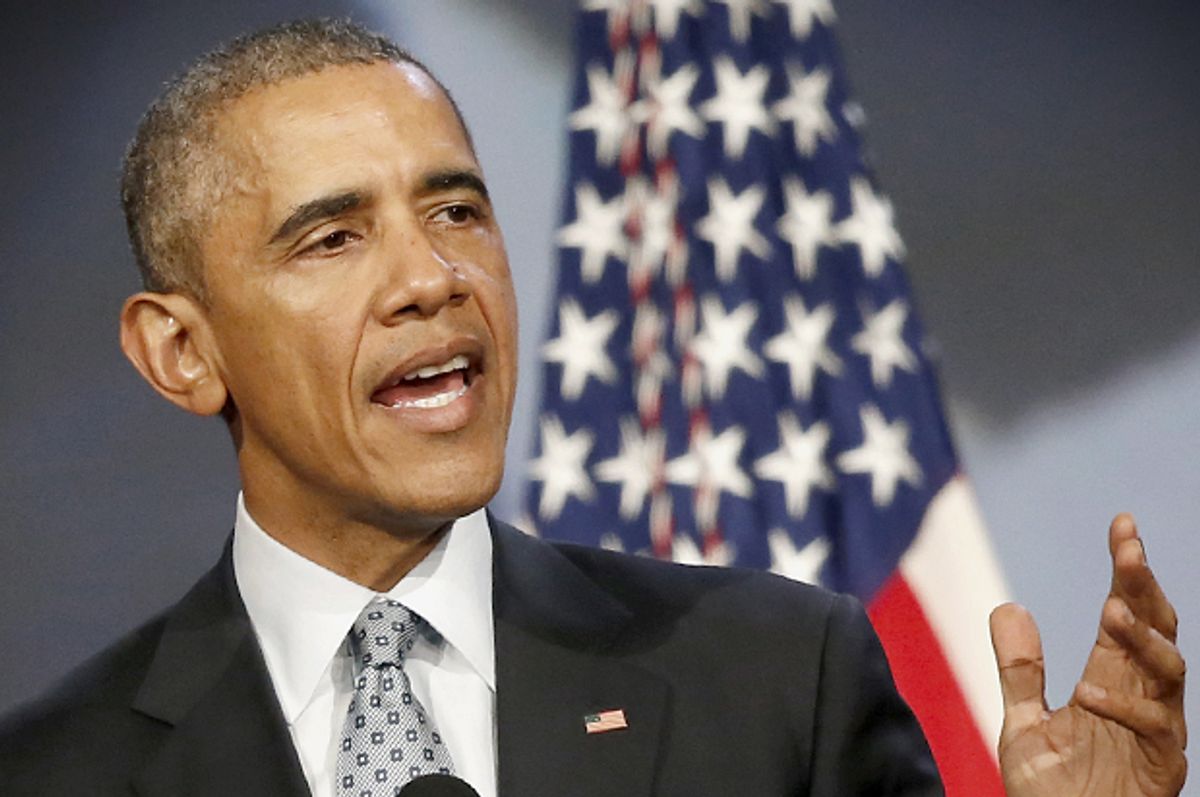Throughout his second term, if not before, President Barack Obama has responded to congressional dysfunction by using his executive powers to test the limits. That’s been true for both policy (immigration) and politics (minimum wage); and it's the lens through which we should understand the executive branch policy changes he announced in Newark, New Jersey, on Monday.
Because although some real-life people will be helped by the administrative tweaks the president mentioned — such as telling the federal Office of Personnel Management to delay questions about criminal history, which will theoretically give applicants a better chance during job interviews — Monday’s declaration was not about policy, first and foremost. It was, as the New York Times put it, “less for [the policies’] individual effect than for the direction they keep the country moving.” It’s about symbolism.
The question, then, is whether the symbol Obama was trying to convey on Monday was a good one. And if you approach the issues of mass incarceration and criminal justice from a pro-reform perspective, the answer was an unequivocal “yes.” Granted, Obama did not go so far as to outright “ban the box” when it came to federal government hires. But he came damn close — and, more important, the media is reporting on the move as if he had.
What does it mean to “ban the box”? Generally, the phrase has been adopted by activists who want to end the requirement that makes the formerly incarcerated check “the box” on job applications identifying them as such. The argument is pretty straightforward: If we truly believe, as we say, that those who have served their time have paid their debt to society and deserve a second chance, then we shouldn’t create unnecessary barriers to their securing gainful employment.
Unfortunately, that’s often exactly what we do. Despite the fact that an increasing number of Americans believe their country sends too many of its people behind bars, study after study finds that most employers want nothing to do with the formerly incarcerated. According to a 2012 study from the National Institute of Justice, for example, having a criminal record reduced an applicant’s likelihood of getting a call-back from an employer “by nearly 50 percent.” And this was in New York City.
That might explain why other surveys show 60 to 75 percent of formerly incarcerated persons are unable to find a job within a year of being released. And in a country with a relatively threadbare social safety net like the United States, being unable to secure steady employment can mean being relegated to a kind of de facto second-class citizenship. The fact that employers are dramatically more likely to hire a white person than a black person — even if they’re both formerly incarcerated — is telling.
Perhaps even more significantly, the president’s decision, and the high-profile way in which he announced it, suggests that Obama is aware of one of the biggest vulnerabilities of the criminal justice reform movement thus far: its occasionally disproportionate emphasis on reform as a cost-saving measure. Earlier this year, I chided the president about a speech he made that, I felt, made this error. But while I seriously doubt anyone at the White House saw the post, I’m glad the president is (unconsciously and indirectly) addressing it nevertheless.
He’s doing this, primarily, by leaning away from the cost-cutting rhetoric and adopting a framing that champions reinvestment instead. This may seem overly subtle or abstract, but it’s important. It reflects the president’s awareness that getting people out from behind bars, while necessary, is not sufficient. As a society, if we really want to stop sacrificing so many millions of lives to the New Jim Crow, we’ll have to address the conditions that got people locked up to begin with. Otherwise, the same things will just keep happening.
During a recent panel discussion on criminal justice reform at the White House, the president made exactly that point. “If … we are reinvesting in treatment, and we are reinvesting resources in police,” Obama said, “then that becomes the foundation upon which the public has confidence in potentially taking a future step … down the road.” Getting people back in their communities, in other words, is not the ending; it’s the start. And to that purpose, Obama’s actions on Monday represented a big step.


Shares